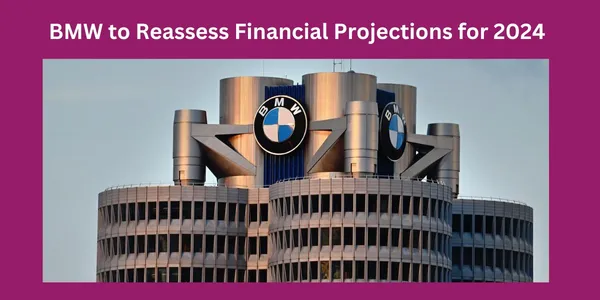BMW is known for its innovation, performance, and high-quality engineering. However, even giants face hiccups, and this time, BMW is dealing with a substantial challenge. The luxury carmaker recently announced a recall affecting over 1.5 million vehicles due to a braking system defect. As a result, the company is reassessing its financial projections for 2024, estimating a significant financial blow. This article dives into the issue, breaking down why this recall happened, what it means for BMW’s future, and how it could affect the company’s bottom line.
Understanding the Braking System Recall
What Led to the Recall?
BMW recently discovered a fault in the braking system in several of its car models. The issue revolves around a defective brake booster, which may reduce the effectiveness of braking, thus increasing the risk of accidents. Safety is always a top priority, and the company immediately issued a recall affecting 1.5 million cars globally.
How Serious is the Problem?
This defect in the brake booster isn’t just a minor inconvenience. In some cases, drivers might experience a significant increase in stopping distance, which could pose serious safety risks. No one wants to feel uncertain about their car’s ability to stop, right? BMW’s swift action reflects the severity of the situation, acknowledging the potential dangers to drivers and passengers alike.
Financial Impact of the Recall
The High Cost of Safety
Fixing this issue won’t come cheap. BMW has estimated that the recall will cost them a high three-digit million amount, and this unexpected expense has forced them to revise their financial outlook for 2024. The hefty costs include not just the repairs, but also the logistics of contacting affected customers, providing replacement parts, and ensuring the issue is resolved efficiently.
Immediate Hit to Earnings
BMW’s 2024 financial projections were already ambitious, but with this sudden recall, the company has announced that it will have to cut its forecast. The recall is expected to dent earnings significantly, putting additional pressure on BMW to find new ways to manage costs and maintain profitability.
Long-Term Repercussions
The recall doesn’t just hurt BMW in the short term. It could also have long-term effects on consumer trust. BMW has a solid reputation for quality, but a major safety recall can lead potential buyers to question whether the brand lives up to its promises. This situation might make BMW’s future marketing campaigns a little trickier, as the company works to regain customer confidence.
The Bigger Picture – What This Means for the Automotive Industry
A Wake-Up Call for Carmakers
BMW’s brake recall isn’t an isolated incident. The automotive industry as a whole has been grappling with increased scrutiny over vehicle safety. As cars become more technologically advanced, the risk of defects also rises. Whether it’s Tesla’s self-driving software or BMW’s brake system, car manufacturers must be extra vigilant to ensure that new innovations don’t come with unintended safety risks.
Regulatory Pressures
Governments and safety organizations around the world are imposing stricter regulations on automakers. Safety recalls, while costly, are crucial to meet these standards. Failing to act could lead to hefty fines and even bigger reputational damage. BMW’s proactive approach demonstrates the importance of compliance with safety regulations.
How BMW Plans to Recover from the Setback
Strengthening Quality Control
To prevent future issues, BMW is expected to tighten its quality control processes. This will likely involve more rigorous testing, particularly in areas involving safety-critical components. The company will also likely invest in improved technologies to monitor potential failures before they escalate into mass recalls.
Innovations on the Horizon
Despite the financial hit, BMW remains committed to innovation. The company is pushing forward with its electric vehicle (EV) strategy, aiming to roll out more EV models by 2025. These efforts are part of the brand’s broader plan to stay competitive in a rapidly changing automotive landscape, where sustainability and innovation are the keys to long-term success.
Cost-Saving Measures
With a substantial financial burden from the recall, BMW will need to find ways to cut costs in other areas. This might include optimizing production processes, renegotiating supplier contracts, or streamlining operations. However, the company must strike a balance, ensuring that cost-saving efforts don’t compromise quality.
What BMW’s Recall Teaches Us About Corporate Accountability
Transparency Builds Trust
One of the positive aspects of BMW’s response to this crisis is its transparency. The company quickly informed customers about the issue, issued a recall, and set about fixing the problem. This open communication fosters trust and credibility, showing that BMW values customer safety above profits.
Learning from Mistakes
No company is immune to errors, but what sets successful companies apart is how they respond. BMW’s handling of this crisis demonstrates its commitment to learning from its mistakes. By addressing the issue head-on, the brand is doing its best to turn a negative situation into an opportunity for improvement.
BMW’s Revised Financial Projections for 2024
The Reality of the Situation
Before the recall, BMW had ambitious goals for 2024. The company had projected significant growth, particularly driven by strong demand for electric vehicles and premium luxury cars. However, the recall has forced BMW to take a more conservative approach, revising its financial targets downward.
Reduced Revenue Expectations
The recall is expected to shave off a considerable portion of BMW’s revenue for 2024. With repair costs alone running into the hundreds of millions, the company’s profit margins will inevitably take a hit. This has prompted analysts to lower their expectations for BMW’s net income for the year.
Shareholder Reaction
BMW’s shareholders are undoubtedly concerned. The company’s stock price could experience fluctuations as the news of the recall continues to develop. Investors will be watching closely to see how BMW handles the situation moving forward and whether it can meet even its reduced targets.
The Road Ahead for BMW
A Bump in the Road, Not the End of the Journey
While this recall is a significant setback, it’s far from the end of the road for BMW. The brand has weathered storms before and emerged stronger. This crisis serves as a reminder that even the most successful companies face challenges, but it’s how they respond that defines their long-term success.
Rebuilding Consumer Confidence
The key for BMW moving forward will be to rebuild consumer confidence. This means ensuring that the recall process is smooth and efficient, and that customers feel safe in their vehicles again. The company will also need to double down on its commitment to innovation and quality, showing that this recall was a one-time issue, not a sign of a larger problem.
Conclusion
BMW’s decision to cut its financial outlook for 2024 after the braking system recall reflects the severity of the situation. This recall, affecting 1.5 million cars, has come at a high cost to the company, both financially and reputationally. However, by acting swiftly and transparently, BMW is taking the necessary steps to address the issue and mitigate the impact. Moving forward, the company will focus on tightening quality control, continuing its push for innovation, and rebuilding customer trust. In the end, while this is a challenging time for BMW, it’s also an opportunity for growth and improvement.
FAQs
1. What caused BMW to issue the recall?
BMW issued the recall after discovering a defect in the brake booster of 1.5 million cars, which could lead to reduced braking effectiveness.
2. How much will the recall cost BMW?
The recall is estimated to cost BMW a high three-digit million amount, leading the company to revise its 2024 financial projections.
3. Will the recall affect BMW’s stock price?
It’s likely that the recall will cause fluctuations in BMW’s stock price as investors react to the news and the company’s revised earnings forecast.
4. How is BMW handling the recall?
BMW has been transparent, issuing a recall and working to repair the affected vehicles while ensuring that customer safety remains a top priority.
5. What is BMW doing to prevent future recalls?
BMW is expected to tighten quality control and improve testing processes to prevent similar issues from occurring in the future.










